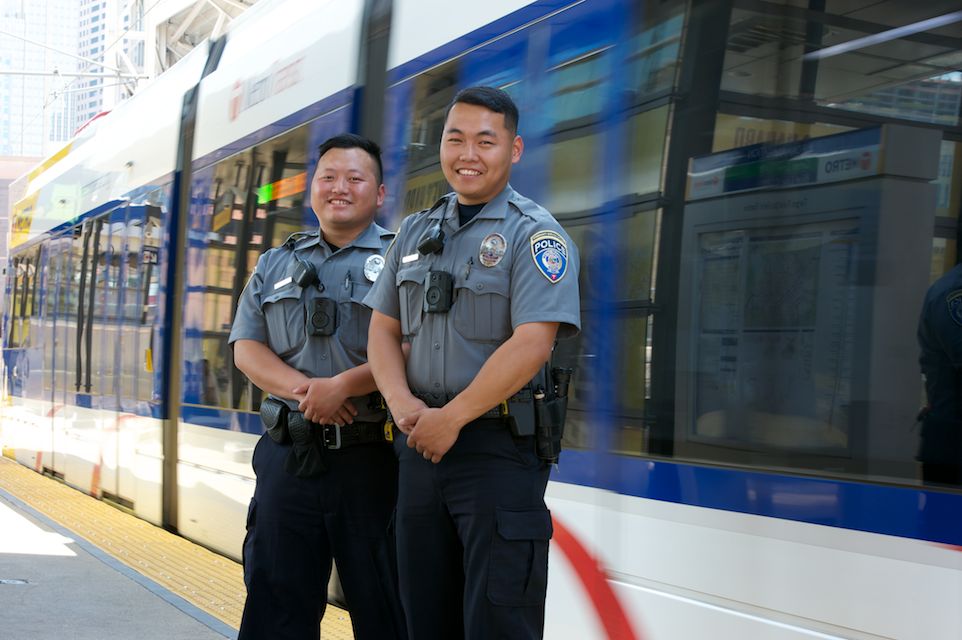
About MTPD
FACT SHEET: Chief Ernest Morales III Vision Plan
FACT SHEET: Community Service Officers (CSOs)
FACT SHEET: Real Time Information Center
FACT SHEET: K9 Patrol Teams
FACT SHEET: Homeless Action Team (HAT)
Do Metro Transit Police officers have the same police authority as city police officers?
Yes. Metro Transit Police officers are fully-sworn peace officers with the same powers of arrest as other city or county law enforcement agencies. MTPD officers receive the same certification as other officers in the state and undergo continuous in-service training.
How do Metro Transit Police officers patrol the transit system?
Both uniformed and undercover officers ride the buses and trains to patrol routes, while others use squads to respond quickly to emergency situations. We respond to, and investigate, all crimes occurring on Metro Transit property, including buses, light rail, commuter trains, facilities and right-of-ways.
Can Metro Transit Police officers take enforcement action when they’re not on Metro Transit property?
Yes. In accordance with Minnesota State Statute 473.407, Metro Transit Police officers may take enforcement action on speeding vehicles and any other criminal, traffic or petty offense anywhere in our eight county, 85+ city jurisdiction. If the incident is not related to transit, MTPD officers will take necessary steps to get the situation under control then defer to the agency that has jurisdiction over the incident for follow-up and investigation.
Safety
What is Metro Transit's Text for Safety number? Answer: 612-900-0411
Text for Safety empowers Metro Transit customers to discreetly report suspicious or unwanted behavior through text messages. Customers can access the service anytime, seven days a week, using the latest version of Metro Transit’s app or by sending a text message to 612-900-0411. The Text for Safety service is free but standard messaging rates apply to text messages, as determined by the user’s mobile plan. Learn more about Text for Safety.
How do the emergency telephones and intercoms work?
Emergency phones are available at all light-rail and rapid bus platforms, and emergency intercom buttons are located inside light-rail train cars. If you need help, simply push the button on either device and a train operator or dispatcher at one of our control centers will take your information and send officers directly to handle your concern.
Where can I find more information about staying safe on transit?
Metro Transit’s Security on Transit page has tips and information for how to stay safe on transit.
Fares
Does Metro Transit deal with those who don't pay their fares?
There are many ways to buy fares and several programs that make them more affordable. So, there’s no excuse to ride transit without paying for your ride.
Still, we know there are people who choose not to pay. To discourage this behavior, Metro Transit representatives who are not sworn police officers check fares and issue non-criminal administrative citations to those who haven’t paid.
Unhoused
What is Metro Transit Police doing about the unhoused on light rail?
Experiencing homelessness is not a crime. Many unhoused riders using Metro Transit's buses and trains pay their fare. Metro Transit Police have a Homeless Action Team (HAT), created in 2018 in collaboration with the Metropolitan Council’s Housing and Redevelopment Authority (Metro HRA). HAT is a team of dedicated MTPD officers who meet people on trains and buses at the end of the night to provide food, clothing, and housing assistance. Metro HRA supplies federally funded Section 8 housing vouchers to help pay rent for people with low incomes. In 2019, more than 100 individuals and families were housed. Recently, HAT received a government innovation award from the Saint Paul Area Chamber of Commerce.
Immigration
What is Metro Transit's immigration enforcement policy?
MTPD officers do not ask for immigration status and won't investigate immigration status unless it's related to human trafficking, drugs, or major felony cases. The chief is the only Metro Transit Police officer who can authorize an Immigration and Customs Enforcement (ICE) investigation. View the Metro Transit Police Department policy manual to learn more.